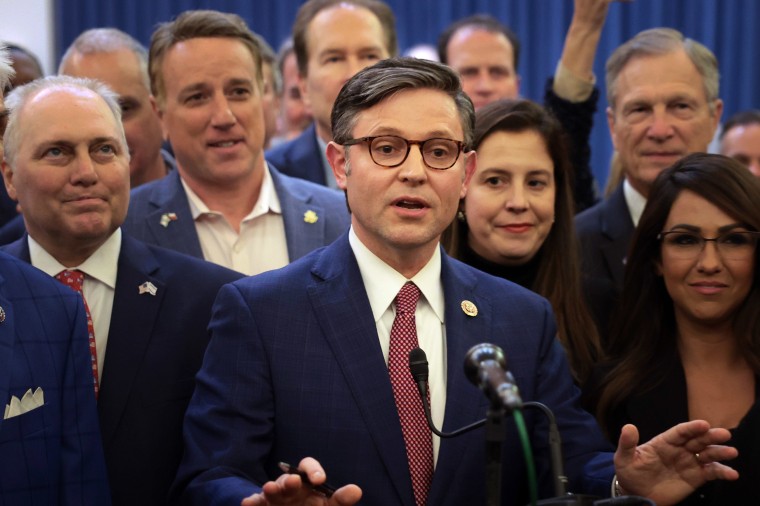The main GOP super PAC involved in House races says the party is poised to make gains next year, even after weeks of chaos paralyzed the House while Republicans searched for the next speaker.
“One year out from Election Day 2024, House Republicans stand in a strong position to hold and grow their majority,” Dan Conston, president of Congressional Leadership Fund, wrote in a new memo to donors shared exclusively with NBC News.
“In the time since Mike Johnson became speaker, I have seen firsthand his eagerness and determination to invest in the fight to expand the House majority,” Conston wrote.
Conston’s memo to donors also looks to quell any concerns that the weeks-long battle over the next speaker could damage Republicans in competitive races, writing that new polling in four battleground districts found that voters “agreed by wide margins that [the incumbent] is working to end the chaos in Washington.”
Conston also added that the group “is in the strongest financial position in its history.”
The future of Congressional Leadership Fund, which has been the main super PAC aligned with House GOP leadership since 2011, under former Speakers John Boehner, Paul Ryan and Kevin McCarthy, was in question after McCarthy's ouster.
But shortly after Johnson was elected, he endorsed the group and Conston said he would stay on as president.
The super PAC surveyed voters on the incumbents in four districts President Joe Biden won in 2020 that Republicans are defending next year — Rep. Mike Garcia in California’s 27th District, Rep. Jen Kiggans in Virginia’s 2nd District, Rep. Nick LaLota in New York’s 1st District and Rep. Mike Lawler in New York’s 17th District.
The polling, conducted Oct. 18-25, which coincided with Johnson’s election as speaker, found that each Republican's image was more favorable than the broader image of the party as a whole. The surveys found Lawler’s image 29 points higher than the general image of Republicans in Congress, while LaLota's image was better 19 points, Garcia’s by 16 points and Kiggans’ by 15 points.
“The political environment is strong and our targeted incumbents’ images are entirely distinct from the national party,” Conston wrote in the memo.
But Democrats believe the speaker fight has hurt Republican candidates. On Friday the Democratic Congressional Campaign Committee circulated new polling from Navigator Research, conducted across 61 House districts from Oct. 19-25, including the four that the Congressional Leadership Fund tested.
The Democratic polling found that while named GOP House members did have higher favorability ratings than the party more broadly, their image ratings were still underwater — that is, more negative than positive. The typical GOP incumbent was viewed unfavorably by 44% of likely voters, while 37% had favorable views of those lawmakers.
Conston wrote that Republicans are also in a strong position one year from Election Day due to strong fundraising from incumbents and an impressive slate of recruits.
He name-checked four “star candidates of character” running in Democratic-held districts: state Rep. Craig Riedel in Ohio’s 9th District, former state Sen. Tom Barrett in Michigan’s 7th District, former Green Beret Derrick Anderson in Virginia’s 7th District, and former New York police officer Alison Esposito in New York’s 18th District.
Conston also touted the group’s “Blue State Program,” noting the slew of House battlegrounds in New York and California. He noted the effort includes work to boost voter contacts, encourage early and absentee voting and persuade swing voters by focusing on Democratic governance in their states.
“One year out, CLF enters this key stage strong and ready to grow this critically important House majority,” Conston wrote.
CORRECTION (10:25 a.m. ET): Congressional Leadership Fund misstated the dates of its district-level polling in the original version of this article. The surveys were conducted Oct. 18-25.

